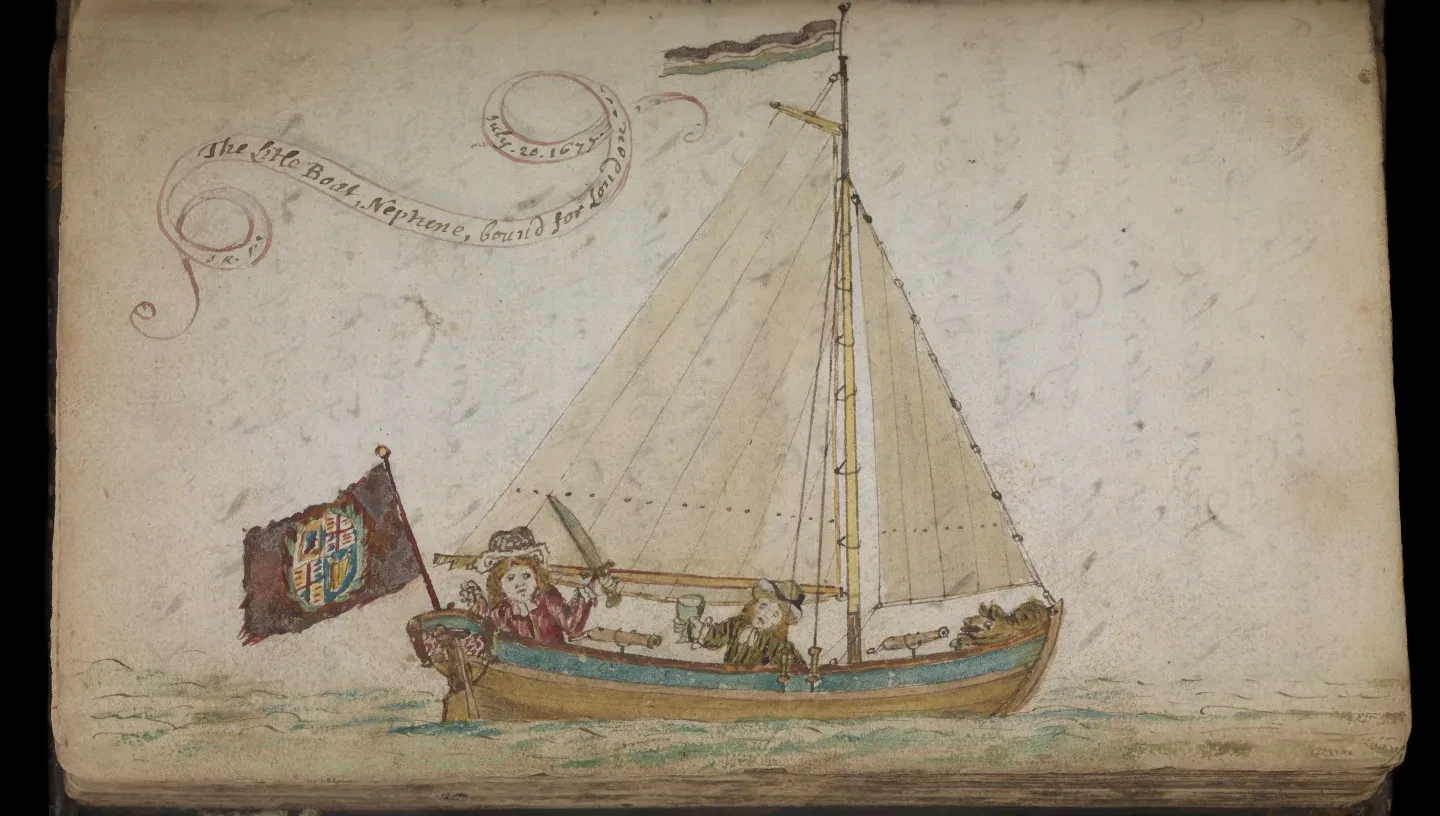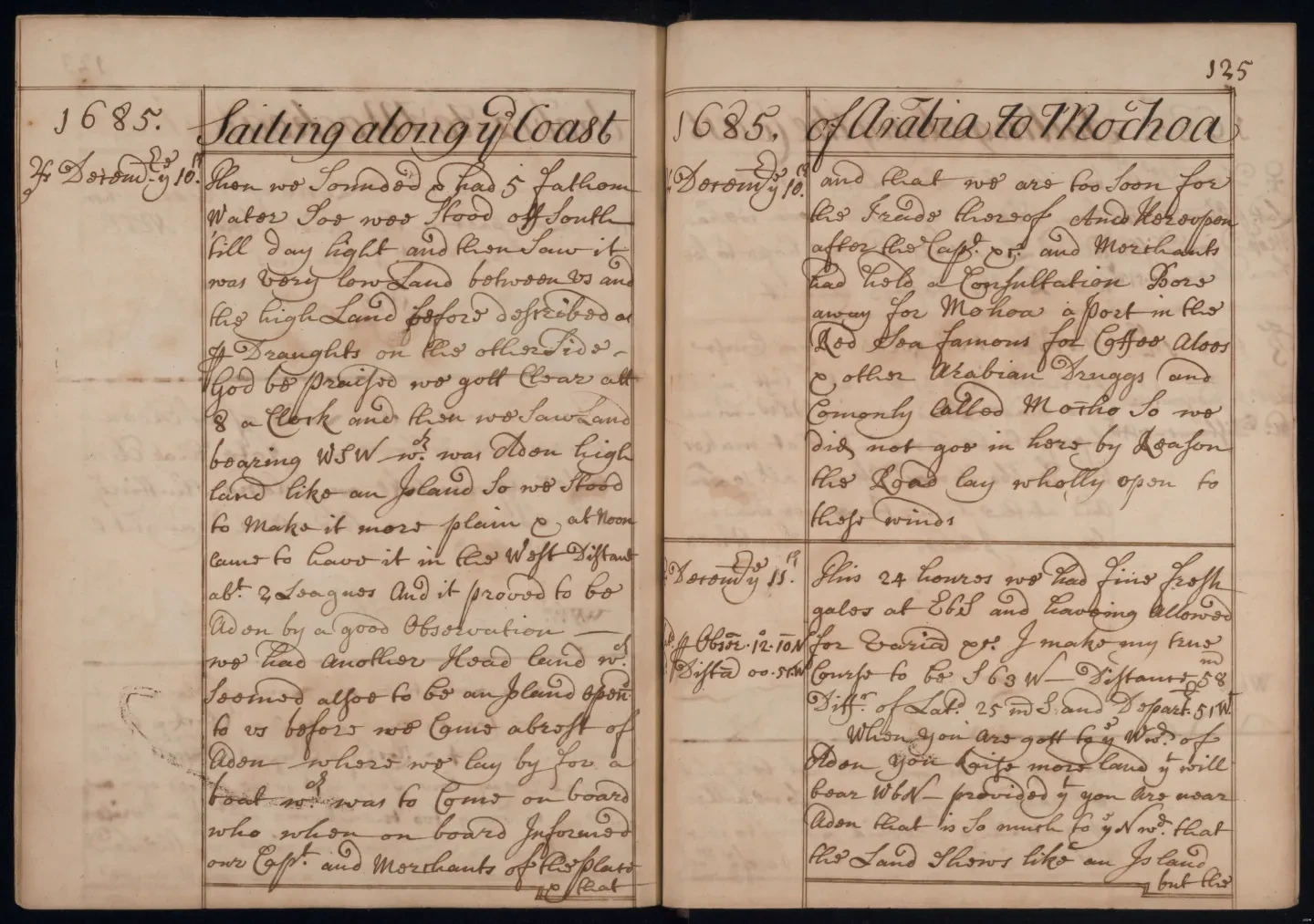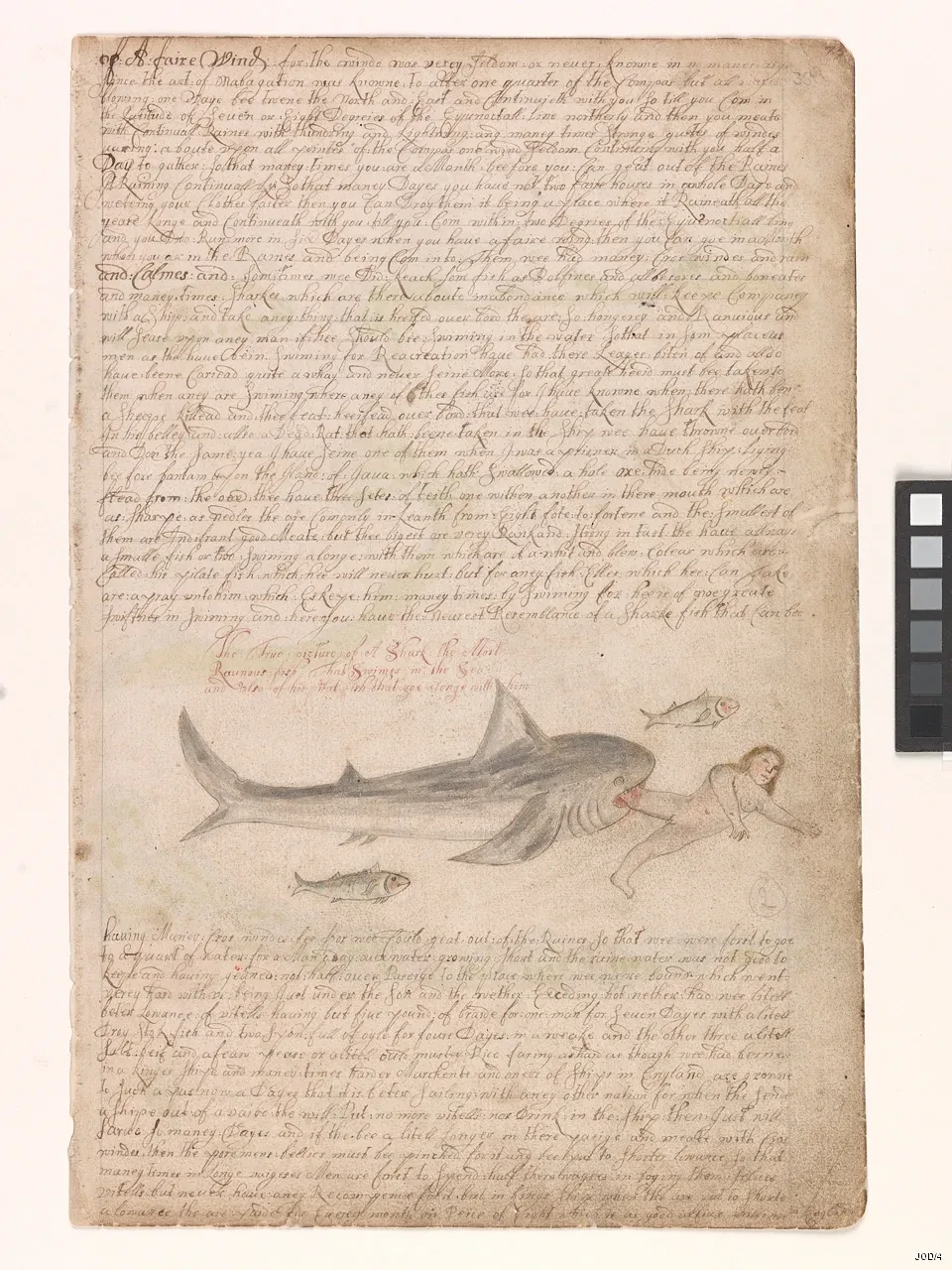
Caird Library Research guide: seventeenth-century sea-faring journals
Written by Jack Avery, former Caird Fellow.
During the seventeenth century, seafarers of all ranks wrote accounts of their voyages. These are usually collectively called ‘journals’. The writing of these might be part of their official duties, for private record, or for circulation among friends and family. Those preserved in the Caird Library and Archive at the National Maritime Museum often showcase the varied interests, experiences, prejudices and creativity (in word and image) of these seafarers.
The word ‘journal’ is an imprecise, catch-all term which can encompass different types of manuscript in both research and library catalogues. It can apply to logbooks, diaries, transcribed or ‘fair-copy’ manuscripts and even printed matter (such as early newsbooks, often written as ‘diurnals’). It is a term that can make these documents particularly difficult to locate and gives a false impression of their uniformity.
This Research Guide focuses on fair-copy manuscripts that give an account of a mariner’s voyages and were usually written up at a later date. These journals emerged out of shipboard writing habits, such as the keeping of diaries, and often used official documents such as logbooks as their sources. This is most obvious during periods of inaction, where transcriptions often fall back on tracking the weather day by day (such as the Journal of Jeremy Roch, IGR/17). While the source texts are almost always lost, it is sometimes possible to compare journals with the logbooks kept by other crew members on the same voyage or expedition.
Care should be taken, however, because such close transcription of logbook originals often gives fair-copy journals the appearance of being an official logbook. There are also some documents, such as the Journal of Samuel Atkins (JOD/173), which combine diary-keeping over time with longer accounts.
The Caird Library and Archive catalogue does not make a significant distinction between seventeenth-century logbooks (LOG/) and journals (JOD/). Not every item catalogued as JOD/ is a true journal, and many of them could as easily fit in LOG/. Some ‘journals’ are not even from sea voyages at all but are records of business on land, for example, the Journal of Sir Richard Haddock (JOD/305). The IGR/ series also includes a variety of these documents.
A good place to start is with a modern edition of the journal that is of interest. Many of these journals have been published, particularly during the first half of the twentieth century (a bibliography is given below). These well-edited editions are the fastest and easiest way to access the journal’s text, but do not include all elements that may be of interest. They are unable to represent the integration of images and text often seen in the journals, and rarely reproduce all of the images. Features such as corrections are usually removed, and spelling is often modernised. Insertions of separate pages (such as the sheets of poetry in Reverend Henry Teonge’s diary, JOD/6) and the deletion of text seen to be unnecessary to the journal (such as the notes in the back of the Journal of Francis Rogers, IGR/18) are common.
Research topics
What makes these manuscripts so valuable and interesting is their diverse form. They are saturated with character, from the social activism of seaman Edward Barlow (JOD/4) to the adventures of the astrologer Jeremy Roch (IGR/17).
The subject matter in these journals can range widely, and can support research on many topics, including:
- Tourism – Voyages to the Mediterranean often combined combat and diplomacy in North Africa with visits to familiar locations. See the journals of Samuel Atkins (JOD/173) and Reverend Henry Teonge (JOD/6) in particular.
- Art and cartography – Ship portraits, illustrations and maps are often included, as authors such as Edward Barlow (JOD/4) drew on their artistic skills developed during shipboard duties.
- Enslavement – Journals like Thomas Allin’s record the relationship between slavery and naval operations, including the liberation of enslaved Europeans in North Africa (DAR/4). Some authors, such as Francis Rogers, also record their business as enslavers (IGR/18).
- Poetry and literature – Many journals include original or quoted poetry, including those of Edward Barlow (JOD/4), Jeremy Roch (IGR/17) and Henry Teonge (JOD/6).
- Astrology and science – Some journals record the importance of astrology on board ships. Jeremy Roch’s, for example, provides data which he analysed to ‘prove’ the truth of astrology (IGR/17). Journals may also be useful sources for understanding geography (Atkin’s survey of the Mediterranean, JOD/173), natural history (Barlow’s depictions of animals he encountered, JOD/4)), engineering (a machine to purify saltwater in a journal by an unknown author, JOD/49) or meteorology (weather data in Thomas Coale’s journal, AND/44).
- Diplomacy and news – Almost all the journals in the collection describe the networks of information between ships, and between ships and communities on land.
Provenance
Who these journals were written for and when is often unclear. This is not helped by their frequently complex routes into the collection, and the unknown parts of their history. Henry Teonge’s journal was so characterful that, after it temporarily disappeared following its first publication in 1825, some considered it a forgery (its authenticity is now proven). We know that some journals were written up on subsequent voyages, during moments of inaction and where source materials might be close by. Teonge wrote up his journal in 1678 while waiting six months in the North Downs for his next voyage to start; Barlow began his mammoth journal while being held prisoner by the Dutch in the East Indies. Some journals, such as Roch’s, however, appear to have been written ashore. While they often seem designed to be circulated among family, ‘to my friends and acquaintance and to any which might take the pains to read it over’ (Barlow), the precise readership of these materials can be difficult to reconstruct, as well as their immediate provenance following the death of the author. Barlow, for example, cannot have had his journal with him when his ship was wrecked off the African coast.
Printed editions available in the Caird Library
Using the online Library catalogue, these items can be requested for viewing in the Caird Library, doing which will prompt you to register for a free Reader's ticket.
Cooper, Dawtrey. 'Three Sea Journals of Stuart Times' includes references to: Dawtry Cooper (IGR/16), Jeremy Roch (IGR/17) and Francis Rogers (IGR/18).
Lubbock, Basil. 'Barlow’s journal: of his life at sea in King’s ships, East and West Indiamen and other merchantmen from 1659 to 1703', 1934. Includes references to: Barlow (JOD/4)
Manwaring, G.E. 'The Diary of Henry Teonge: Chaplain on board HM’s Ship’s Assistance, Bristol and Royal Oak', 1927. Includes references to: Teonge (JOD/6).
Journals beyond the Caird Library and Archive
Other libraries and archives hold similar journals, although not as many as the Caird Library. The British Library in particular has a strong collection, although again logbooks, journals and other written published manuscripts, such as the presentation ‘journals’ of the cartographer William Hack, are often similarly catalogued.
Modern published versions of journals, originals of which are not held by the Caird Library and Archive, include:
Baltharpe, John (ed.) 'The Straights Voyage, or St David’s Poem', 1959. A poetic ‘journal’ written by John Baltharpe of his voyage.
Coxere, Edward. 'Adventures by Sea of Edward Coxere: A Relation of the Several Adventures by Sea with the Dangers, Difficulties and Hardships Met for Several Years', 1945.
Poynter, F.N.L. 'The Journal of James Yonge, Plymouth Surgeon (1647–1721)', 1963.
Further reading:
Fumerton, Patricia. Unsettled: The Culture of Mobility and the Working Poor in Early Modern England, 2006.
Liebich, Susann and Publicover, Laurence (eds), Shipboard Literary Cultures: Reading, Writing, and Performing at Sea, 2022.
Mentz, Steven. Shipwreck Modernity: Ecologies of Globalization, 1550–1719, 2015.
Further instructions:
Barlow Journal - to view the entire digitised journal online, click on this link for the item number - JOD/4.
Few of the journals have been digitised. They will need to be consulted in person, or request a low resolution scan of the item.
Search the Archive catalogue for original manuscripts, including, but not limited to: Journals and Diaries and prints and drawings.
To order items to enhance your research project or for personal interest, please use the online Library catalogue.
Research Guides - these offer further help in locating items in the library and archive collections. Topics include: the Merchant Navy, the Royal Navy, the First and Second World War, the Lloyd's collections, Finding Black and Asian Sailors, South Asian History Research Guide.
Blog Article: Poetry and astrology in seventeenth-century maritime journals
This blog explores the seventeenth-century maritime journals held at the Caird Library and Archive, and in particular the one written by the amateur poet and astrologer Jeremy Roch.
Register for a free Reader’s ticket.
This page provides further information about visiting the Caird Library.
Help with your research - please email the library team at library@rmg.co.uk.
Main image:
Journal of Jeremy Roch, 1659–92 (IGR/17)
National Maritime Museum, Greenwich, London

